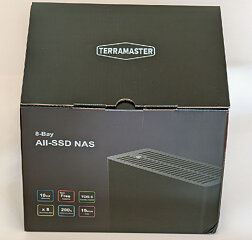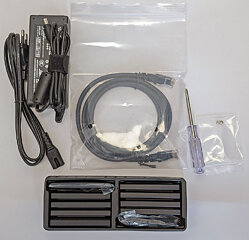 0
0
TerraMaster F8 SSD Plus Review - Compact and quiet
(0 Comments) »Introduction

The TerraMaster F8 SSD Plus is something quite different in the NAS market, not only is it an all flash based NAS, but it's also the most compact such device we've seen to date, still managing to pack in no less than eight M.2 drives. On top of that, it sports a decent SoC that has enough grunt to keep most people happy, and comes equipped with both 16 GB RAM and 10 Gbps Ethernet as standard. On the flip side, it has no expansion slots, although additional storage can be attached via one of the three USB 3.2 Gen 2 (10 Gbps) ports. One of our concerns going into this review was noise, as the F8 SSD Plus is cooled by a pair of comparatively tiny 50 mm fans, but at no point during use were we disturbed by the noise it produced, we'll cover that in more detail later in the review.

This review was originally planned to be posted toward the end of last year, but due to some performance related issues, we decided to postpone the review and wait for a software resolution. Considering the specifications of the hardware used in the F8 SSD Plus, it was severely underperforming as shipped, but on the plus side, TerraMaster was very co-operative in trying to work out why we weren't seeing the expected performance. Part of the reason appears to be that it shipped with TerraMaster's latest TOS 6 operating system, which seemingly wasn't quite mature enough for this type of hardware. We weren't told the specifics of what was done to resolve the issue, but we've since seen file copy time improve by a factor of five, from sub HDD performance to performing within expectations.
In this review, we'll also take a closer look at TOS 6, which at least from a user interface standpoint isn't vastly different compared to TOS 5.x, although some changes have been made. TerraMaster has maybe most importantly moved to a modern Linux kernel, by taking TOS 6 to a 6.1 LTS kernel. That said, this kernel was released at the end of 2022, which is still over two years old. However, in contrast, companies like QNAP are still on 10-year-old kernels, so TerraMaster should still be commended for using a reasonably modern kernel to build their OS on top of. As it's an LTS kernel, it will be getting updates for almost another two years from now. TOS 6 is also said to boot up five times faster than TOS 5 and TerraMaster has adopted a new root file system that is meant to be fully compatible with Ubuntu 22.04's file system. We'll go into the other improvements later in the review, but let's start by taking a closer look at the F8 SSD Plus.
Specifications
| TerraMaster F8 SSD PlusX Specs & Features | |
|---|---|
| Processor | Intel Core i3-N305 8c/8t 8x Alder Lake-N 3.8 GHz |
| Memory | 1x 16 GB DDR5 4800 MHz SO-DIMM (expandable to 32 GB using one slot) |
| Storage | 8x M.2 |
| RAID Levels: | Single Disk, JBOD, RAID 0, 1, 5, 6, 10, TRAID, TRAID+ |
| Capacity | Up to 64 TB (8 x 8 TB SDD) |
| Operating System | TOS 6.0.610-00165 (Linux Kernel 6.1.58) |
| File System (Internal Drives) |
|
| File System (External Drives) |
|
| Networking |
|
| Expansion Interfaces |
|
| I/O Ports |
|
| Dimensions | 177 (H) x 60 (W) x 140 (D) mm |
| Weight | 600 grams without drives |
| Power Consumption | Operation: 45 W HDD Idle: 9 W (with 8x Seagate 2 TB NVMe M.2 SSD's installed according to the manufacturer) |
| Power Supply | External, 72 W 100–240 V input 12 V 6 A output Edacpower Electronics EA10682U-120 |
| Fan | 2x 50 mm |
| Warranty | 2-years |
| Price Excluding VAT (at time of review) | $800 |
Packaging and Bundle
The F8 SSD Plus ships in comparatively nice retail packaging and the NAS is packaged in protective foam, which might actually be a bit excessive, considering how light the device is. The bundled accessories are a tad different from what you normally get with a NAS, although you do get a power adapter, an Ethernet cable and a couple of screws, as well as a small screwdriver. However, what stands out is the small tray filled with eight heatsinks, the accompanying 16 rubber bands that are used to attach the heatsinks to your SSDs, and eight rather thick thermal pads. We'll take a closer look at how well setup this works or doesn't work later in the review.
This article is not public yet. Patreon Gold Supporters can read it early.
Apr 10th, 2025 01:38 EDT
change timezone
Latest GPU Drivers
New Forum Posts
- TPU's Nostalgic Hardware Club (20210)
- Do you use Linux? (563)
- (Some of) What I'd like to See From a Final Fantasy IX Remake (9)
- Kindly help in Identifying GPU and Suitable bios (18)
- Asking before I mess up (18)
- ## [Golden Sample] RTX 5080 – 3300 MHz @ 1.020 V (Stock Curve) – Ultra-Stable & Efficient (43)
- RX 9000 series GPU Owners Club (272)
- Is the Asrock Z790M PG Lightning/D4 decent for i7 12700KF? (5)
- 5070ti overclock...what are your settings? (0)
- Will you buy a RTX 5090? (477)
Popular Reviews
- The Last Of Us Part 2 Performance Benchmark Review - 30 GPUs Compared
- MCHOSE L7 Pro Review
- ASRock Z890 Taichi OCF Review
- Sapphire Radeon RX 9070 XT Pulse Review
- PowerColor Radeon RX 9070 Hellhound Review
- Upcoming Hardware Launches 2025 (Updated Apr 2025)
- Sapphire Radeon RX 9070 XT Nitro+ Review - Beating NVIDIA
- Acer Predator GM9000 2 TB Review
- UPERFECT UStation Delta Max Review - Two Screens In One
- ASUS GeForce RTX 5080 Astral OC Review
Controversial News Posts
- NVIDIA GeForce RTX 5060 Ti 16 GB SKU Likely Launching at $499, According to Supply Chain Leak (172)
- MSI Doesn't Plan Radeon RX 9000 Series GPUs, Skips AMD RDNA 4 Generation Entirely (146)
- Microsoft Introduces Copilot for Gaming (124)
- AMD Radeon RX 9070 XT Reportedly Outperforms RTX 5080 Through Undervolting (119)
- NVIDIA Reportedly Prepares GeForce RTX 5060 and RTX 5060 Ti Unveil Tomorrow (115)
- Over 200,000 Sold Radeon RX 9070 and RX 9070 XT GPUs? AMD Says No Number was Given (100)
- Nintendo Switch 2 Launches June 5 at $449.99 with New Hardware and Games (99)
- Nintendo Confirms That Switch 2 Joy-Cons Will Not Utilize Hall Effect Stick Technology (99)



